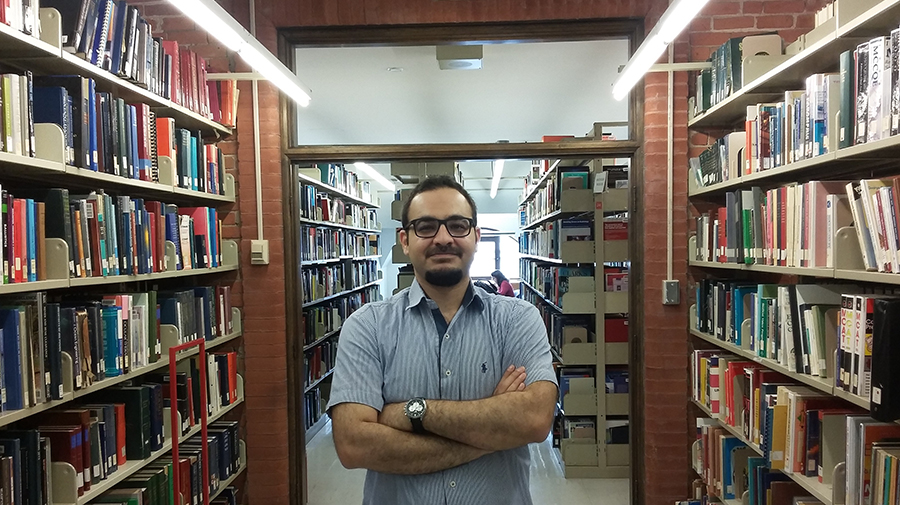
Masdar Institute’s interdisciplinary, sustainability-focused research programs taught Mohammad Alobaidi, a Class of 2013 MSc in Water and Environmental Engineering alumnus, that the key to solving today’s most pressing environmental challenges lies at the intersection of fields and disciplines. For Alobaidi, this intersection is computer science and critical infrastructure systems.
Alobaidi’s research studies at MI, which focused on developing novel machine learning frameworks for applications critical to energy and water infrastructures, helped him realize how data can be leveraged to achieve the kind of sustainable and resilient infrastructure systems needed to support sustainable development across the globe. Machine learning is a very important technique in computer science that identifies patterns in large sets of data from identifiable features and uses this pattern recognition capability to interpret and understand new data of the same type. The technique is being widely applied in fields such as entertainment, transportation, energy and healthcare.
“The open-minded, multi-disciplinary and novel research activities carried out at Masdar Institute helped me hone my research priorities and taught me how to take on challenges for a better world through sustainable engineering,” Alobaidi remarked.
Today, Alobaidi is building upon the knowledge and skills he gained at Masdar Institute with PhD studies in Civil Engineering at McGill University in Canada. As a Research Fellow there, he is developing innovative Machine Learning frameworks that will help decision makers and engineers develop more sustainable energy and water infrastructures.
“Although Machine Learning has been recently growing due to the fast growth in computational resource and power, not much has been done to utilize this field for infrastructure research,” Alobaidi explained.
“I am working to ultimately formulate a uniform framework that can adequately integrate the use of these evolutionary data-driven techniques in Civil Engineering,” he added.
In recognition of his high-caliber research and performance, the PhD candidate is a recipient to the prestigious McGill Doctoral Award, along with the McConnel Memorial Fellowship and the John B. Porter Fellowship.
Alobaidi’s PhD research focuses on assessing the ability of critical infrastructures to endure extreme floods, earth submergence (when seawater seeps below the earth’s crust), severe winds and other extreme weather events. He then plans to design guidelines to detect and counteract the negative impacts of dangerous climate events on infrastructure. Additionally, he aims to map a country’s most energy-demanding neighborhoods in order to determine where future renewable energy projects are most needed.
Before initiating his PhD studies at McGill University, Alobaidi worked as a Research Engineer at Masdar Institute’s Center for Water and Environment (iWater). During his two-year posting, he worked closely with the International Renewable Energy Agency (IRENA) to outline new and innovative wind energy assessment guidelines for countries in Africa. The project contributed to the development of cheap and accurate wind potential assessment guidelines, which were used to motivate the countries to assess their national wind energy potential and make use of their precious resources.
In an effort to improve the Machine Learning models that are often used to guide sustainable development, Alobaidi developed an Ensemble-based machine learning tool, which he named EMIRATES, during his studies at MI. Ensemble methods combine multiple learning models to produce improved results. Critical to an ensemble model’s success is its ability to combine diverse sets of data, which is what Alobaidi’s EMIRATES framework was able to successfully achieve.
Alobaidi received the distinction of having several papers based on research he conducted during his Master’s studies and as a Research Engineer published in prestigious journals, including the IEEE Journal of Selected Topics in Applied Earth Observations and Remote Sensing (J-STARS) in 2014 and Advances in Water Resources in 2015. He also had the honor of participating in the Masdar Institute-led Young Future Energy Leaders (YFEL) program in 2013.
Recently, Alobaidi was appointed to represent McGill University in an event held by the UAE Embassy in Washington DC to promote the McGill/UAE Science, Technology, Engineering and Math (STEM) Program for brilliant young UAE nationals, under the patronage of the Crown Price Court of Abu Dhabi.
After he finishes his PhD studies, the young Jordan-native, who was born and raised in the UAE, plans to return to his home country, where he hopes to conduct research, teach, and ultimately give back to his UAE community.
“I look forward to working alongside some of the brilliant minds I was fortunate to meet throughout my studies, all while teaching younger minds (and learning from them) to contribute back to my community and be part of the leap-forward to a better world.”
Erica Solomon
News and Features Writer
27 October 2016